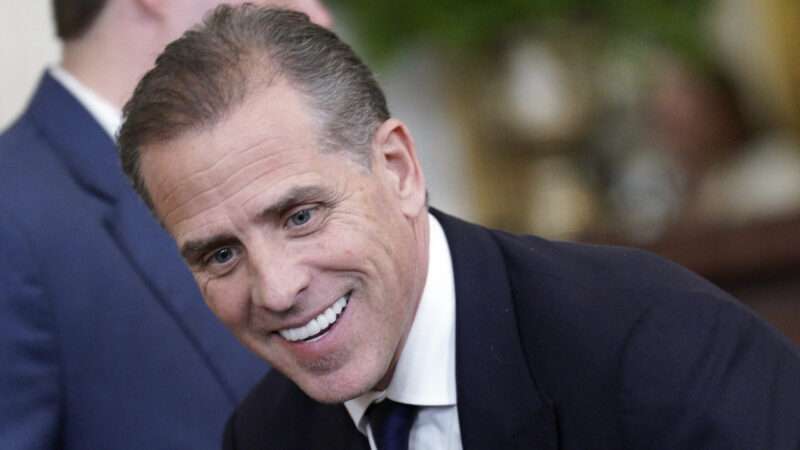
"Hunter was singled out only because he is my son," Joe Biden said on Sunday, when he issued a pardon that saved Hunter Biden from serving time for his gun and tax crimes. That much was accurate, but not in the way the president meant.
Naked nepotism allowed Hunter Biden to avoid the consequences of a criminal justice system that punishes people for conduct that violates no one's rights and compounds that punishment when they demand the trial to which they are entitled under the Sixth Amendment. While the pardon was undeniably hypocritical, those injustices are real, and they affect many people who lack the political connections to escape them.
Last June, a federal jury convicted Hunter Biden of three felonies based on his 2018 purchase of a revolver, which was illegal because he was a crack cocaine user. The case sits at the intersection of two policies that punish people for actions that are not inherently criminal.
As the philosopher Douglas Husak has observed, drug and gun possession laws forbid "inchoate offenses," which involve conduct that is not necessarily harmful. They "do not proscribe harm itself," Husak notes, "but rather the possibility of harm—a possibility that need not (and typically does not) materialize when the offense is committed."
Since Hunter Biden's possession of a revolver harmed no one, his father argues, a prison sentence was not justified for that offense. Although the president is right about that, his position is blatantly inconsistent with his support for gun laws that authorize such penalties.
The Biden administration has vigorously defended the arbitrary, constitutionally dubious gun law that Hunter Biden violated, insisting that cannabis consumers are so untrustworthy and dangerous that the government is justified in threatening them with prison if they dare to exercise their Second Amendment rights. And in 2022, the president signed a law that increased the maximum penalty for drug users who possess firearms while creating an additional potential charge against them.
Joe Biden also complains that prosecutors threw the book at his son after a proposed plea deal fell apart under judicial scrutiny last year. But that is par for the course when defendants insist on exercising their constitutional right to trial by jury.
In the gun case, a single felony charge that Special Counsel David Weiss was initially prepared to drop after Hunter Biden completed a pretrial diversion program became three felony charges, all based on the same transaction. As a result, Biden faced up to 25 years in prison, quite a jump from zero time behind bars under the nixed diversion agreement.
In the tax case, two misdemeanors became three felonies and six misdemeanors, all of which were covered by a guilty plea that Biden entered in September. That increased the maximum penalty to 17 years in a case where Weiss initially was prepared to recommend probation.
The dramatic escalation in potential punishment vividly illustrated the "trial penalty" that prosecutors routinely impose on defendants who make the government prove its case. That threat helps explain why 97 percent of federal felony convictions are based on guilty pleas, a reality that transforms trial by jury from a promise to a fantasy.
A president cannot unilaterally change the laws that authorize draconian punishments for inchoate offenses and give prosecutors enormous power to coerce guilty pleas. But he can ameliorate the resulting injustices by exercising his clemency powers, which Joe Biden so far has largely failed to do.
During his 2020 campaign, Biden promised that he would "use the president's clemency power to secure the release of individuals facing unduly long sentences for certain non-violent and drug crimes." But as of this week, he had received more than 10,500 petitions for commutations and granted just 132, or about 1 percent.
That is roughly the same as Donald Trump's rate and one-fifth Barack Obama's. But Biden still has a few weeks to show that his mercy extends beyond his own kin.
© Copyright 2024 by Creators Syndicate Inc.
The post The President Still Has Time To Show His Mercy Extends Beyond His Own Son appeared first on Reason.com.







